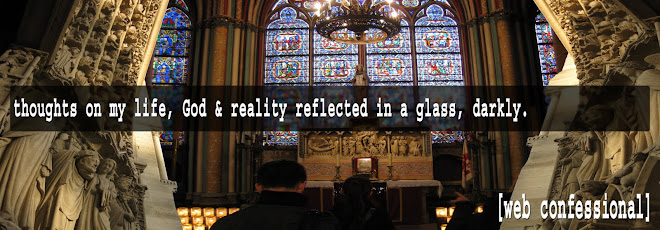so, since i discussed my views concerning the idea of "going to heaven" and the ultimate point of christianity (i.e. God's kingdom invading earth), i guess it's fitting to discuss the other side of the coin. i've already discussed my issues with what the bible says concerning hell here, and, honestly, i would be all for striking the word "hell" from the christian lexicon. hell, as most christians think of it, borrows heavily from dante and mythology. nowhere, in the scriptures, does the idea of hell, as we commonly think of it, appear. and the word "hell" actually comes from the norse goddess of the underworld (ht clothman).
so, what is hell? i've been pondering this question for years now, and i can't say that i have a solid answer, nor do i think i need one. instead, i look at it from a few different perspectives and conclude that it's probably a sum of all of them. a perspective that's been very helpful comes from my pastor rob bell. in his book sex god, he opens the first chapter with his understanding of hell. basically, he believes, like i do, that heaven is invading earth and that heaven is anywhere where God's rule is lived out, which is why we're taught to pray "on earth as it is in heaven." rob says: "when we say something was a "living hell," we mean that it was void of any love or peace or beauty or meaning. it was absent of the will and desire of God." so when things are going as God intends, heaven is being lived at the moment, and hell is the opposite of that. i watch the show intervention. it's a documentary portraying addicts facing interventions. i just watched one about a lesbian meth addict from a conservative christian family. at one point, her sister says something like "i'm not concerned about what happens to her here, i'm concerned about her going to hell." my immediate reaction was, "going? she's already there."
in his book speaking my mind, tony campolo goes over several different perspectives on hell. he alludes that he believes hell is separation from God, but that people can still turn to christ even after death. he also makes note that the one time where jesus clearly tells a story about people being judged, that they aren't judged by whether or not they had a conversion experience; they are judged by how they treated the least of those among them. of course, one could argue that how one treats the least of these is the fruit of said conversion experience. but then the obvious question is: what about those who aren't christians who live like christians, better than most christains? this has always been an interesting question for me.
the other day, i attended a lecture at work about the increasing resistance to anti-microbial drugs of certain stds. after the lecture, i was talking with the pharmD who spoke, about the vaccine gardasil. we discussed how those in the bible-belt were opposing its use because it might encourage girls to have sex. my thought was that fear should not be the driving force behind celibacy. growing up, i was terrified of going to hell. for most of my childhood and early teens i believed that, in spite of the salvation prayers i prayed, i wasn't good enough to actually be a real christian. hell was and is a very powerful tool to win converts. my old church actually put on plays portraying people being thrown into hell in order to scare people into becoming christians. a common line of thinking in the church is that if there is no hell, then we can just live the way we want. so my question to those that espouse that idea is: so do you live the way you do, and believe what you believe, simply out of fear? is the avoidance of hell what american christianity boils down to?
to tie this in with christmas, i'll offer a final perspective. one of the gifts i received this past year was a cd by a band i love called thrice, and on this cd is a song called the arsonist. the song describes a city that has become corrupted by all sorts of evil, and an arsonist who plans on burning it down to rebuild it. in other words, he plans on cleansing it by fire and his motive for doing so isn't anger, but love. here are some of the lyrics:
There are still good shepherds scattered, but they're far between and few.
And the sheep's skin that the wolves all wear is so thin I see right through.
And I think maybe all that's needed is some gas and open flame,
because I don't think that any one of them believes that fire can erase their names.
But I will see this city burn.
I said I will see this city burn.
We will burn it down and build it again,what was buried in flame.
Burn it down and build it again from the bricks that remain.
I love this city, but I've set and numbered its days.
I love this city, enough that I'll set it ABLAZE.
Subscribe to:
Post Comments (Atom)

No comments:
Post a Comment